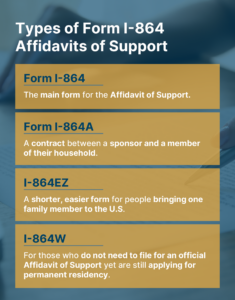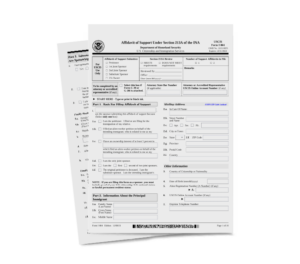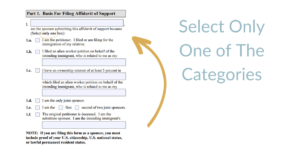Immigration Insights
If you have moved to the United States because you have family who are U.S. citizens or lawful permanent residents (LPR), the United States Citizenship and Immigration Service (USCIS) requires you to submit Form I-864, also known as an Affidavit of Support.
People who move to the U.S. for work may also need this form. In either situation, it’s a way to prove that someone in the U.S. can help financially support you.
What Is the USCIS Affidavit of Support?
Form I-864 is titled the Affidavit of Support Under Section 213A of the Immigration and Nationality Act (INA).
The form’s purpose is to show that the recipient of the Affidavit of Support will not need to rely on government financial support.
What Does The Affidavit of Support Mean for the Sponsor in the U.S.?
The family member (or employer) in the U.S. who signs this form is the sponsor and promises to financially support their immigrant family members (or employees).
The USCIS Affidavit of Support is a contract.
We often see sponsors file Form I-864 paired with Form I-130 or Form I-140 to petition (1) for their relative or (2) for an employee to become a permanent resident.
Sponsored relatives can include spouses, children, siblings, and parents.
If the sponsor does not support the sponsored immigrant and the immigrant seeks governmental assistance, the supporting agency can sue the sponsor for repayment.
What Does Form I-864 Mean for the Immigrating Family Member?
As an immigrant, if you have a family member in the U.S. signing Form I-864, you should not apply for local, state, or federal financial assistance (with a few exceptions like Medicaid and Child Nutrition Act services).
If you face financial difficulties, the family member in the U.S. who signed the form will be responsible for helping you.
Types of Form I-864 Affidavits of Support
There are four forms categorized under Form I-864.
In most cases, you will only need to fill out a single form, but more forms may be necessary. The forms you must complete depend on your financial situation, how many people you sponsor, and the immigrant’s circumstances.
Below is a breakdown of the four forms categorized under I-864.
Form I-864
Form I-864 is the main form for the Affidavit of Support. If you bring a family member to the U.S. using Form I-130 or an employee using Form I-140, you’ll use Form I-864.
A joint sponsor can share the responsibility for supporting the person coming to the U.S. with the sponsor and must also sign Form I-864, Affidavit of Support.
The joint sponsor must live in the U.S. and earn enough money—125% of the poverty guidelines or more–for their household size and the number of sponsored individuals.
Form I-864A
Form I-864A is a contract between a sponsor and a member of their household.
Like a joint sponsor, this person’s income and financial assets help the sponsor meet the sponsorship requirements.
It’s different from a joint sponsor because this person is a qualifying family member (spouse, sibling, parent, or adult child) in the same household.
I-864EZ
Form I-864EZ is a shorter, easier form for people bringing one family member to the U.S. using Form I-130.
You must meet these qualifications if you’re using this form:
- You’re using Form I-130 to bring a family member to the U.S.
- Only one family member is listed on Form I-130.
- Your income from your salary or pension is enough to support your family member.
You can’t use this form if you have a more complicated sponsorship situation (For example, if you need a joint sponsor or you’re an employer, etc.).
I-864W
Form I-864W is for those who do not need to file for an official Affidavit of Support yet are still applying for permanent residency.
Form I-864W is an exception to Form I-864.
When Can You Use Form I-864W?
- If the person moving to the U.S. has worked here for 40 qualifying periods (quarters), they don’t need the usual financial support form. Not sure about the work periods? The Social Security Administration can help figure it out!
- If a child under 18 can become a U.S. citizen through the Child Citizenship Act of 2000 and meets the requirements, they can use Form I-864W. The child needs to have one parent who is a U.S. citizen, entered the U.S. as a lawful permanent resident (LPR), lives with the U.S. citizen parent, and, if adopted, the adoption is legally recognized in their U.S. state.
- If you’re applying independently for permanent residency, you’ll use Form I-864W. You’ll usually need an approval form, called Form I-360, from the U.S. Citizenship and Immigration Service (USCIS).
How to Fill Out Form I-864
Affidavit of Support Requirements
I-864 Checklist
Proof of your ability to financially sponsor an immigrant:
- Recent tax return copy: Include W-2s or a statement explaining if you didn’t need to file.
- Additional income proof: Copies of Form 1099, schedules, and other income evidence.
- Self-employment income proof: A copy of your recent Schedule C, D, E, or F from your tax return.
- Additional documents (optional): Last three years of tax returns, recent six months of pay stubs, and a letter from your employer
Proof of identity and status:
- For U.S. Citizens or U.S. Nationals: Birth Certificate, Passport, or Certificate of Naturalization
- For Lawful Permanent Residents: Copy of front and back of Permanent Resident Card (Green Card)
- If Joint Sponsor, Substitute Sponsor, or Relative of an Employment-Based Immigrant: Proof of U.S. Status (Citizenship, lawful permanent resident, or U.S. national status).
If using household income to meet financial requirements:
- Separate Form I-864A for each person whose income you are using.
- Proof of relationship and residency for each non-immigrant household member.
- Continued employment proof if using the intending immigrant’s income.
- Copies of household members’ tax returns: Including W-2s and 1099s or an explanation if they didn’t need to file.
If using assets to prove financial ability:
- Asset documentation: Proving location, ownership, date of acquisition, and value.
- Liabilities evidence: Any liens or liabilities against the assets.
- Separate Form I-864A for each household member (not including the intending immigrant) using assets.
If sponsoring more than one immigrant:
- Original Affidavit of Support copies for any additional immigrants listed.
If active duty military sponsoring spouse/child:
- Proof of active military status.
I-864 Income Requirements
The current Affidavit of Support income requirements are on the USCIS website. You can find the guidelines for all 50 states.
There are three options to choose from:
- Alaska
- Hawaii
- 48 contiguous States, D.C., Puerto Rico, the U.S. Virgin Islands, Guam, and the Commonwealth of the Northern Mariana Islands
The options differ, so look at the correct location and poverty guidelines.
There are also different requirements for different households. For example, a family with two people in Wisconsin, 125% of the poverty guidelines, is $28,350 for 2023, but a household with four people is $43,125.
Note that there are different requirements for sponsors on active duty for the United States military and petitioning on behalf of their spouse or child. If you are an active service member, you must submit proof of your active military status along with Form I-864.
Form I-864 Application Fee
There is no filing fee if Form I-864 is filed with USCIS or the Department of State (DOS) abroad.
Form I-864 Form Instructions
Part 1: Why You’re Submitting Form I-864
Action Required: Provide your full name (the sponsor) and select the Item Number that reflects your basis for filing Form I-864.
Part 2: Information About the Principal Immigrant (Beneficiary)
Provide the principal immigrant’s full name, mailing address, country of citizenship, date of birth, Alien Registration Number, USCIS Online Account Number, and daytime telephone number.
Part 3: Information About the Immigrants You Are Sponsoring
Indicate whether you are sponsoring the principal immigrant and provide information about family members immigrating with the principal immigrant.
Part 4: Information About You (Sponsor)
Provide your full name, mailing and physical address, country of domicile, date and place of birth, U.S. Social Security Number, Alien Registration Number, USCIS Online Account Number, and information about military service.
Part 5: Sponsor’s Household Size
Calculate your household size, including yourself, dependents, and any intending immigrants you are sponsoring.
Part 6: Sponsor’s Employment and Income
Provide information about your employment and current individual annual income. You must submit either an IRS transcript or a photocopy of your Federal individual income tax return for the most recent tax year.
Part 7: Use of Assets to Supplement Income (Optional)
Complete this part if your Current Annual Household Income does not meet the requirement and you are using assets to supplement income. You must provide evidence of the value of your assets and the assets of a household member or the intending immigrant.
Part 8 – 10: Signatures
- Part 8: Carefully read the contract, sign, and date the affidavit.
- Part 9: If an interpreter assisted you, they must fill out this section, sign, and date the affidavit.
- Part 10: If someone else prepared the affidavit, they need to fill out this section, sign, and date the affidavit.
Part 11: Additional Information
Use this part if extra space is needed to provide additional information within this affidavit. Attach separate sheets if more space is needed, indicating the Page Number, Part Number, and Item Number to which the information refers.
Affidavit of Support FAQ
When Does Sponsorship End?
You will stop being financially responsible when the resident you sponsored has:
- Become a U.S. Citizen.
- Worked 40 quarters under the Social Security Act, which takes about 10 years.
- Been deported, lost their LPR status, or obtained an adjustment of status during removal proceedings. If the last option applies, a new Affidavit of Support may still be required.
- Passed away.
Even if you sponsor your spouse and later get divorced, you’ll continue to be their sponsor until one of the qualified conditions applies to your situation.
Who Doesn’t Need to Complete Form I-864?
Individuals who are self-petitioning as widows or widowers of U.S. citizens and immigrants self-petitioning as a battered spouse or child under the Violence Against Women Act do not need to complete Form I-864.
What If My Sponsor Passes Away?
If the sponsor passes away after the Form I-864 has been approved but before the immigrant has arrived in the United States, the approval may be revoked.
In this case, a substitute sponsor can file a new Form I-864. A substitute sponsor must be a close family member, such as a spouse, parent, mother-in-law, father-in-law, sibling, child (at least 18 years of age), son, daughter, son-in-law, daughter-in-law, brother-in-law, or sister-in-law.
Can I Sign an I-864 Electronically?
If you receive Form I-864 from the National Visa Center (NVC), you can submit it online via the Consular Electronic Application Center (CEAC).
If you’re submitting Form I-864 to USCIS directly, possibly with Form I-130 or Form I-129F, send it to the USCIS Chicago lockbox.
How Long Does it Take After Submitting an Affidavit of Support for Processing to Happen?
The frustrating reality is there isn’t a guaranteed answer for how long processing will take for your immigration forms and processing. Typically, it will take at least six weeks, but depending on your situation and processing center, it could take longer than a year.
If you’re submitting Form I-864 along with other forms like your I-130, you can use USCIS’s Processing Times Calculator to determine the current estimated wait times based on your circumstances.
Expert Guidance on Form I-864 With Immigration Lawyers at Scott D. Pollock & Associates, P.C.
Whether you are a sponsor or an immigrating family member, our experienced Chicago immigration lawyers at Scott D. Pollock & Associates, P.C. are poised to guide you through every step of the Affidavit of Support process with:
- Personalized Advice: We tailor your solutions to your individual or family immigration goals.
- Strategic Insight: We leverage our 70+ years of combined experience for smooth navigation through immigration pathways.
- Accessible Assistance: We are available for online interactions or convenient in-person consultations at our downtown Chicago offices.
Contact us by filling out an online form today.
View Similar Articles



